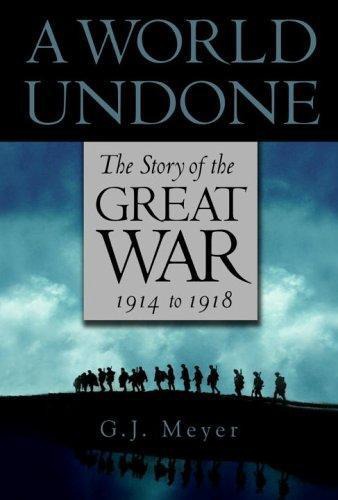
A World Undone
The Story of the Great War, 1914 to 1918
کتاب های مرتبط
- اطلاعات
- نقد و بررسی
- دیدگاه کاربران
نقد و بررسی

Starred review from April 10, 2006
Meyer sets out to integrate the war's discrete elements into a single work of popular history and delivers a worthy counterpoint to Hew Strachan's magisterial three-volume scholarly project, The First World War
. A journalist and author (Executive Blues
), Meyer doesn't offer original synthesis or analysis, but he does bring a clear, economical style to the war's beginnings; the gridlock produced by the successes and failures of both sides; the divided military and political counsels that hobbled efforts at resolving operational and diplomatic stalemates; and above all the constant carnage, on a scale that staggers the imagination. Meyer provides brief, useful background on subjects from the Armenian genocide to the Alsace-Lorraine question—topics he considers crucial to an understanding of the war, but too cursorily explained in most popular histories. Correspondingly, he blends "foreground, background, and sidelights" to highlight the complex interactions of apparently unconnected events behind the four-year catastrophic war that destroyed a world and defined a century. Constructing a readable, coherent text in that format is a demanding challenge, accomplished with brio.

May 1, 2006
This narrative history of the Great War by independent scholar Meyer ("The Memphis Murders" fits into the recent historiographical trend of devoting increased attention to events outside of Western Europe. He tells the story with an interesting narrative twist: chapters on specific events are followed by -background - sections that detail a case study or theme that helps illuminate the major events of that chapter. For example, Meyer examines the significance of anti-Semitism and the place of Jews in German society since emancipation in a background piece after Chapter 22 on events in 1916. This innovative method has a number of advantages: readers not interested, for instance, in the sometimes tedious details of such matters as dynastic politics can stick to the main chapters, which usually focus on the quest for victory. It also, however, risks stripping the action of much of the historical context necessary for understanding developments (e.g., British commanders are discussed in a background section to Chapter 11). While Meyer has done a laudable job for general readers, his book does not offer specialists any new insights. Recommended for public libraries." -Frederic Krome, Jacob Rader Marcus Ctr. of the American Jewish Archives, Cincinnati"
Copyright 2006 Library Journal, LLC Used with permission.

May 15, 2006
One only has to look at a few of today's "hotspots" (the Balkans and the Middle East) to realize that World War I's effects remain a determining factor in international relations. It may seem impossible to write an "intimate" account of such a global catastrophe, but Meyer has succeeded in doing just that: a masterful narrative history that eloquently conveys the sense of a civilization engaged in massive self-destruction, while its leaders, blinded by hubris, nationalism, or outright ignorance, led the charge. Although Meyer pays ample attention to the broad themes of causation and military strategies, he consistently reminds us that the war was a compilation of millions of individual tragedies. He captures the horror and futility of trench warfare, the slaughter at Gallipoli, and the genocide of Armenians as experienced by those who were there. Meyer also offers interesting and controversial insights into the motivations of many of the key participants. This is an outstanding survey of a cataclysm that still casts a shadow over world affairs.(Reprinted with permission of Booklist, copyright 2006, American Library Association.)

























دیدگاه کاربران